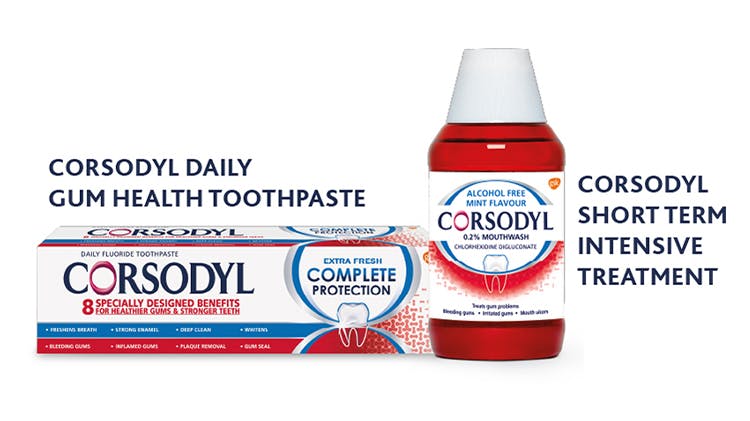Sodium Bicarbonate Toothpaste For Bleeding Gums - Corsodyl
Supporting you to enhance your patients’ clean and gum health
Preventing gum disease at home requires a strict daily routine, but that’s easier said than done. Patients may find it difficult to maintain this routine every day, especially when getting to hard-to-reach areas of the mouth.
Yet change is possible. So, what makes Corsodyl your ally in making it happen?
Corsodyl toothpaste is a unique formulation containing sodium bicarbonate, optimised at 67% concentration. What does that mean for the gum health of your patients?
The sodium bicarbonate penetrates the plaque matrix, where it disrupts and breaks bonds in the biofilm to loosen plaque. As a result, Corsodyl toothpaste softens the plaque on the tooth surface, making it easier to brush away. This means a four times reduction in plaque build-up in comparison to non-sodium bicarbonate toothpastes*1.
What’s more, Corsodyl toothpaste softens plaque in interproximal spaces, reducing five times more plaque build-up than non-sodium bicarbonate toothpastes in those hard-to-reach areas*1.
And the effects on gingivitis? There are approximately 2.5 fewer bleeding sites with Corsodyl toothpaste than with non-sodium bicarbonate toothpastes*2.
This leads to a meaningful difference that supports you and your patients to take action on gingivitis, helping prevent the progression to periodontitis – all supported by clinical, published data.
Order samples today to discover how, together, we can go above and beyond to positively affect the gum health of your patients.
*All patients received a professional clean at baseline and followed a twice-daily brushing regime for 6 months

Product range
Explore our range of products designed to address your patients’ gum health needs
Patient care resources
Discover theories of behaviour change and advice from experts, plus downloadable patient support tools .

